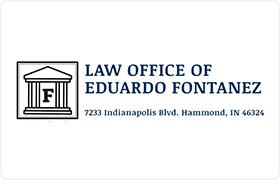Hobart Juvenile Law Lawyer, Indiana
Sponsored Law Firm
-
 x
x

Click For More Info:
-
Law Office of Eduardo Fontanez
7233 Indianapolis Blvd Hammond, IN 46324» view mapCriminal Defense, Divorce & Family Law Former Judge & Former Deputy Prosecutor
I hope we can resolve any issue you may need. Here at the Law Office of Eduardo Fontanez, are focused on providing high-quality service and customer satisfaction.
800-697-7560
Margo Rita Babineaux
Juvenile Law, Government, Trusts, Bankruptcy
Status: In Good Standing Licensed: 26 Years
Cynthia A. Tilden
Juvenile Law, Government, Divorce & Family Law
Status: In Good Standing Licensed: 33 Years
George Ronald Livarchik
Juvenile Law, Lawsuit & Dispute, Trusts, Estate
Status: In Good Standing Licensed: 45 Years
Courtney Cathryn Smith
Juvenile Law, Trusts, Divorce & Family Law
Status: In Good Standing Licensed: 8 Years
Christina Joy Miller
Juvenile Law, Dispute Resolution, Family Law, Divorce
Status: In Good Standing Licensed: 36 Years
Izabela Bebekoski
Juvenile Law, Estate Planning, Family Law, Medical Malpractice, Personal Injury
Status: In Good Standing Licensed: 16 Years
 Eduardo Fontanez Hammond, IN
Eduardo Fontanez Hammond, IN Practice AreasExpertise
Practice AreasExpertise
